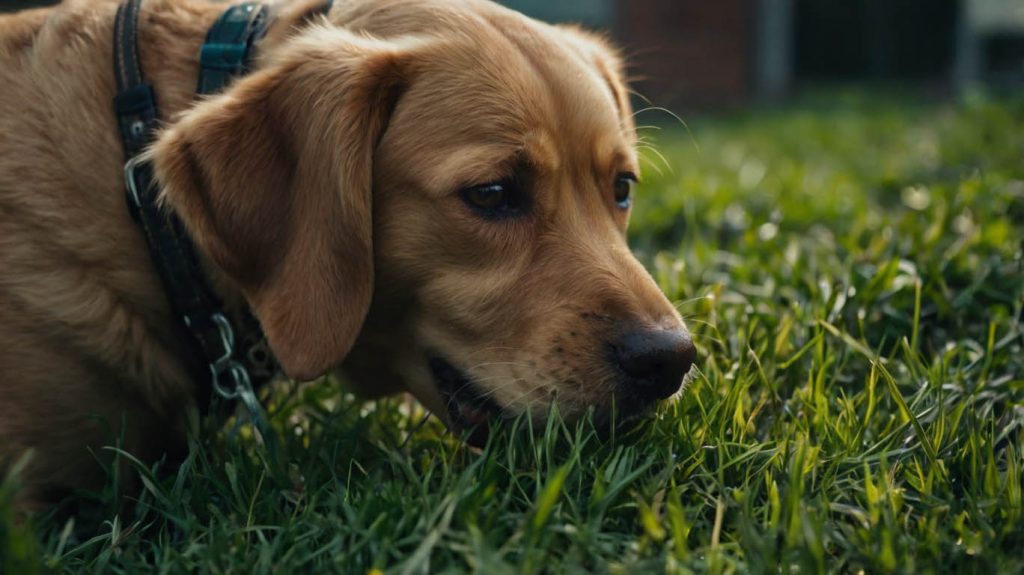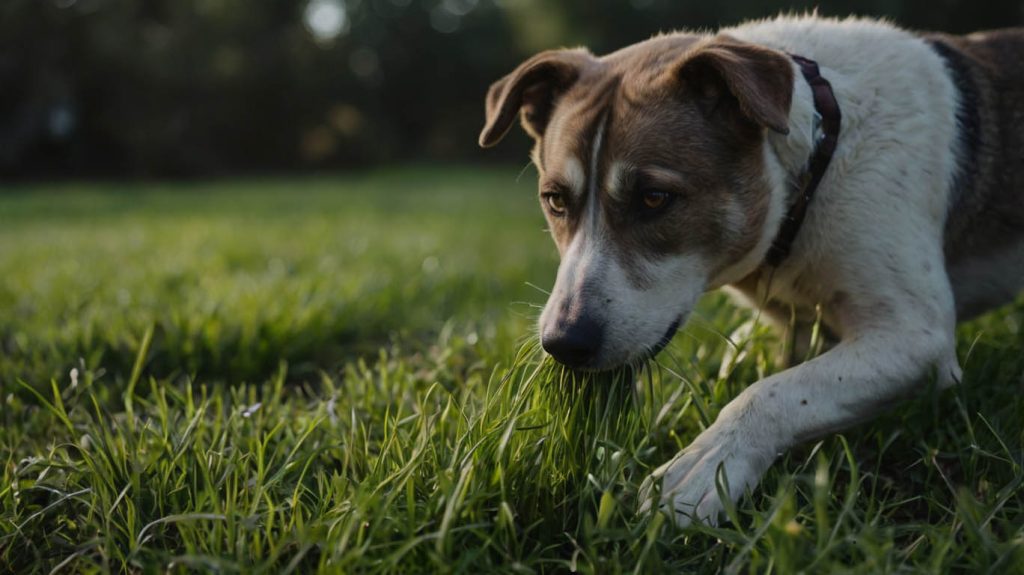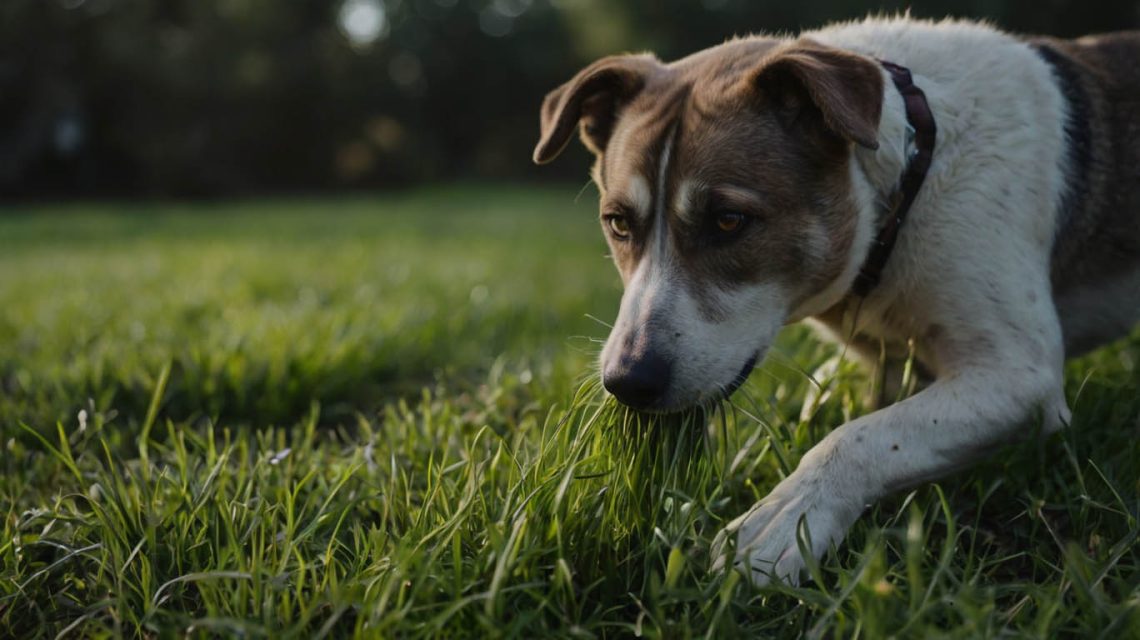The Ultimate Guide: Why Is My Dog Eating Grass?
The story is one that plays out in backyards and parks everywhere. You’re enjoying a beautiful day outside with your dog when you look over and see them diligently munching on a patch of grass as if it were a gourmet salad. This common but peculiar behavior immediately sparks a question in every owner’s mind: Why is my dog eating grass? For years, the conventional wisdom has been that this is a sure sign your dog feels sick and is trying to make themselves vomit. While that can sometimes be the case, the full story is far more complex and fascinating.
This comprehensive guide will tell the complete story behind this quirky canine habit. We will begin by debunking the common myths and exploring the leading scientific and behavioral theories. Subsequently, we will investigate the potential nutritional and psychological drivers, helping you understand the “why” from your dog’s perspective. Furthermore, we will provide a clear checklist for when this behavior might signal a more serious underlying issue that requires a vet visit. Consequently, you will move from confusion to clarity, armed with the knowledge to understand your dog’s behavior and ensure their well-being.
Why Is My Dog Eating Grass? Debunking the Biggest Myth
Before we explore the real reasons, let’s address the most pervasive myth: dogs eat grass only when they are sick to their stomach. While it’s true that some dogs will vomit after eating grass, research suggests this is not the primary motivation for most of them. In fact, one study found that fewer than 10% of dogs showed signs of illness before eating grass, and less than 25% of grass-eating dogs vomited regularly afterward.
So, if they’re not all feeling sick, why is my dog eating grass? The truth is, this behavior, known as pica (the act of eating non-food items), can stem from a variety of physical, psychological, and instinctual reasons.

The Leading Theories on Why Your Dog is Eating Grass
Veterinarians and animal behaviorists have several compelling theories that, when woven together, tell the full story of this common behavior.
It’s a Normal, Instinctual Behavior
The most widely accepted theory is that eating grass is simply a normal, ancestral behavior.
- The Story of the Wild Dog: The wild ancestors of our modern dogs were not pure carnivores; they were opportunistic omnivores. They would consume the entire prey animal, including the contents of its stomach, which often contained grass and other plant matter. Therefore, a taste for vegetation is likely a hardwired, instinctual part of their nature. The grass may provide a source of fiber that was part of their ancestral diet. This is a primary reason for the answer to why is my dog eating grass.
A Potential Nutritional Deficiency
Another leading theory is that your dog may be trying to supplement their diet.
- Searching for Fiber: A common hypothesis is that a dog eating grass is seeking to add roughage or fiber to their diet. Fiber is important for healthy digestion and passing stool. If your dog is on a diet that is low in fiber, they may instinctively turn to grass to fill that void.
- Micronutrient Needs: While less common with today’s high-quality commercial dog foods, it is possible that a dog could be lacking certain micronutrients and is attempting to get them from plant matter.
The Simple Answer: They Just Like It
Sometimes, the simplest explanation is the correct one.
- Taste and Texture: For some dogs, the answer to why is my dog eating grass might be that they simply enjoy the taste and texture of it. This is especially true of fresh, sweet spring grass. For these dogs, it’s not a sign of a problem but is simply a form of enrichment, much like sniffing an interesting smell.
A Sign of Boredom or Anxiety
Behavioral factors can also play a significant role.
- The Boredom Buster: A dog left in a yard with nothing to do may start munching on grass simply to pass the time. It’s a self-soothing or stimulating activity. If the grass eating is accompanied by other signs of boredom, like digging or destructive chewing, this could be the cause.
- An Anxiety Response: For some dogs, chewing can be a self-soothing mechanism. A dog that is anxious about being left alone or stressed by loud noises might start eating grass as a displacement behavior to cope with their feelings.

Why Your Dog is Eating Grass and Then Vomiting
So, what about the dogs that do vomit after eating grass? The story here is a bit of a “chicken or the egg” scenario.
- The Irritation Theory: It’s believed that dogs don’t have the necessary enzymes to break down and digest large amounts of grass. The long, unchewed blades can tickle the back of their throat and the lining of their stomach, which can trigger the vomiting reflex.
- Intentional or Accidental?: The big question is whether they do this intentionally to relieve an already upset stomach or if the vomiting is just an accidental byproduct of eating something their system can’t handle. It’s likely a bit of both. A dog that already feels nauseous might instinctively eat grass, which then helps them clear their stomach.
When to Be Concerned: When to Call the Vet
For the vast majority of dogs, occasional grass eating is a harmless, normal behavior. However, there are certain situations where it can be a red flag. It’s time to consult your veterinarian if:
- The behavior starts suddenly and is excessive or compulsive.
- The grass eating is accompanied by other signs of illness, such as persistent vomiting (not just after eating grass), diarrhea, weight loss, lethargy, or loss of appetite.
- You suspect the grass has been treated with pesticides, herbicides, or fertilizers. These chemicals can be toxic to your dog.
- Your dog is eating large quantities of grass and not eating their regular food.
Your vet can help rule out any underlying medical issues, such as gastrointestinal disease, nutritional deficiencies, or even pica. Reputable sources like the American Kennel Club (AKC) provide excellent overviews on this topic.
You Can Now Understand Your Dog’s Quirky Habit
The story of your dog’s grass-eating habit is likely a simple one. It’s probably a harmless quirk rooted in their ancestry, a search for a little extra fiber, or simply a sign that they enjoy the taste. By understanding the various reasons why your dog is eating grass, you can move from a place of worry to one of informed observation. Pay attention to the context, watch for any accompanying signs of illness, and ensure their environment is safe and stimulating. Most of the time, you can simply smile at this quirky, natural behavior and carry on with your day.
Does your dog eat grass? Have you noticed if it’s a certain type or at a certain time of day? Share your observations in the comments below! For more on decoding your dog’s behavior, check out our guide on [Understanding Dogs Body Language – Clear Signals Explained].


